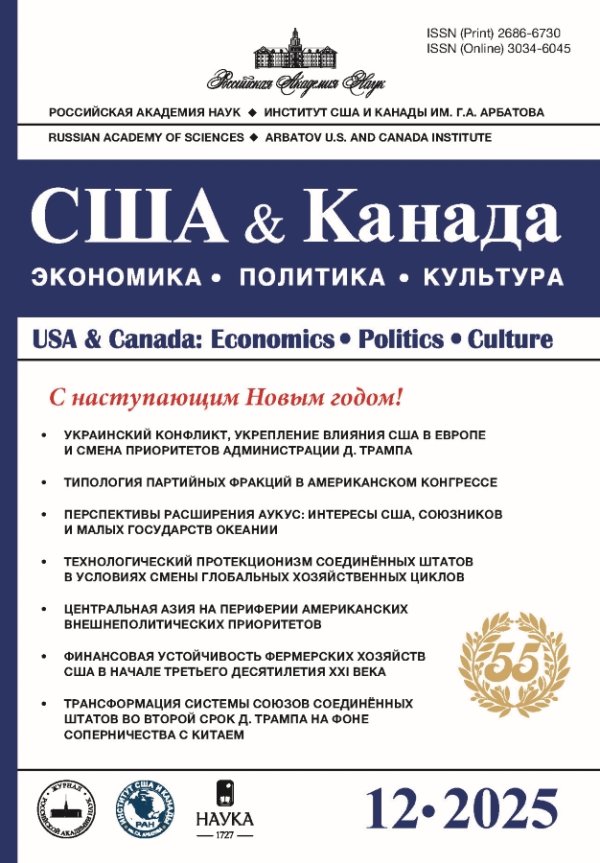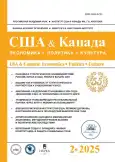Richard Florida on the Alarming Trends of Urbanization and Its Socio-Economic Consequences (Notes on the American Experience for Russia)
- Authors: Surguladze V.S.1
-
Affiliations:
- Financial University under the Government of the Russian Federation
- Issue: No 2 (2025)
- Pages: 109-124
- Section: Reader’s Deliberations
- URL: https://journal-vniispk.ru/2686-6730/article/view/289872
- DOI: https://doi.org/10.31857/S2686673025020081
- EDN: https://elibrary.ru/INJPOJ
- ID: 289872
Cite item
Abstract
The negative trends in the development of modern cities, identified by the famous American urbanist and author of the concept of the creative class, Richard Florida, remain relevant and necessitate a comprehensive analysis of the crises caused by rapid urbanization and the accompanying socio-economic transformations of society. The COVID-19 pandemic has accelerated a number of alarming processes: an increasing number of employees of high-tech companies have switched to remote work, the importance of innovation activity centers has been decreasing not only specialists, but also the headquarters of IT giants have been leaving Silicon Valley. The outflow of affluent middle class segments and the relocation of offices have affected New York. These trends force us to rethink the methodology and goals of strategic planning in the Russian Federation, in particular, to analyze the adequacy of Moscow's urban planning policy and territorial planning focused on the development of large urban agglomerations in Russia. They also raise the question of the need to preserve the positive legacy of Soviet urban planning practice as implemented in Moscow, which has been highly appreciated by a well-known American specialist.
About the authors
Vakhtang Sh. Surguladze
Financial University under the Government of the Russian Federation
Email: bafmg@mail.ru
ORCID iD: 0000-0002-7948-0128
Candidate of Sciences (Philosophy), senior lecturer of the Chair of political science of the Faculty of Social Sciences and Mass Communications Moscow, Russian Federation
References
- Ануреев С. Бюджет компромиссов и отложенных реформ. Потенциал более справедливого перераспределения «бюджетного пирога» не исчерпан. Завтра. 24 ноября 2020. Available at: https://zavtra.ru/blogs/byudzhet_kompromissov_i_otlozhennih_reform (accessed 1.09.2024).
- Одинцова Е. Право на солнце: будут ли пересматривать нормативы естественного освещения жилья в России // Комсомольская правда. 2.02.2021. Available at: https://www.kp.ru/daily/27233/4361019/ (accessed 1.09.2024).
- Петрова Ю., Штыкина А. Путин объявил конец эпохи либерализма перед саммитом G20. Ведомости. 2019. Available at: https://www.vedomosti.ru/politics/artic-les/2019/06/27/805261-putin (accessed 1.09.2024).
- Тоньини Дж. Любимые мегаполисы миллиардеров: 10 городов, где живёт больше всего богатейших людей планеты. В рейтинге городов, в которых живёт больше всего миллиардеров, Москва уступает только Нью-Йорку и Гонконгу. Больше 80% российских миллиардеров обосновались в столице. Forbes. 8.04.2020. Available at: https://yandex.ru/turbo/forbes.ru/s/milliardery-photogallery/397197-lyubimye-megapolisy-milliarderov-10-gorodov-gde-zhivet-bolshe-vsego (accessed 1.09.2024).
- Frequency Questionnaire. Accountable Tech. July 15-19, 2020. Available at: https://accountabletech.org/wp-content/uploads/2020/07/Accountable-Tech-071920-FQ.pdf 21 p. P. 8. (accessed 1.09.2024).
- Alton, L. Tech Companies Are Leaving Bay Area in Droves - Where Are They Going? Digitalist Magazine. 14 November 2019. Available at: https://www.digitalistmag.com/digital-economy/2019/11/14/tech-companies-are-leaving-bay-area-in-droves-where-are-they-going-06201480/ (accessed 1.09.2024).
- Altucher, J. New York City is dead forever. New York Post. August 17, 2020. Available at: https://nypost.com/2020/08/17/nyc-is-dead-forever-heres-why-james-altucher/ (accessed 1.09.2024).
- Budman, S. Silicon Valley Pain Index highlights wealth inequality. NBC. June 13 2024. Available at: https://www.nbcbayarea.com/news/local/making-it-in-the-bay/silicon-valley-pain-index-wealth-inequality/3566250/ (accessed 1.09.2024).
- Carrie Wong, J. ‘We all suffer’: why San Francisco techies hate the city they transformed. The Guardian. July 1, 2019. Available at: https://www.theguardian.com/cities/2019/jul/01/san-francisco-big-tech-workers-industry (accessed 1.09.2024).
- Della Cava, M. San Francisco is losing residents because it’s too expansive for nearly everyone. USA Today. October 19, 2019. Available at: https://www.usatoday.com/story/news/-nation/2019/10/19/california-housing-crisis-residents-flee-san-francisco-because-costs/398519-6002/ (accessed 1.09.2024).
- Deutsche Bank, Goldman Sachs plans to flee NYC a sign of big trouble. New York Post. December 16, 2020. Available at: https://nypost.com/2020/12/16/deutsche-bank-goldman-sachs-plans-to-flee-nyc-sign-of-big-trouble/ (accessed 1.09.2024).
- Escape from. New York: 300,000 households flee as lockdown and surging crime sour residents. Russia Today. 15 November, 2020. Available at: https://www.rt.com/usa/506808-new-york-exodus-lockdown-crime/ (accessed 1.09.2024).
- Frier, S. Tech Workers Consider Escaping Silicon Valley’s Sky-High Rents. After major companies announce their employees won’t need to come in, many are recalculating the cost of living near the office. Bloomberg Businessweek. 14 May, 2020. Available at: https://www.bloomberg.com/news/articles/2020-05-14/tech-workers-consider-escaping-silicon-valley-s-sky-high-rents (accessed 1.09.2024).
- Grant, N., King, I. Pioneering tech company to leave Silicon Valley for Texas. Fortune. December 2, 2020. Available at: https://fortune.com/2020/12/01/pioneering-tech-company-to-leave-silicon-valley-for-texas/ (accessed 1.09.2024).
- Heath, R. Why Silicon Valley could become tomorrow’s Detroit. The San Francisco Bay Area’s tech business models and government relationships will face challenges from all sides in 2021. Politico. December 18, 2020. Available at: https://www.politico.com/news/2020/12/18/silicon-valley-bay-area-business-model-448065 (accessed 1.09.2024).
- Murphy, K. Oracle joins HP and Elon Musk in California-to-Texas move. Politico . December 11, 2020. Available at: https://www.politico.com/states/california/story/2020/12/11/oracle-joins-hp-and-elon-musk-in-california-to-texas-move-9424903 (accessed 1.09.2024).
- Schiffer, Z. Byte Flight. How an exodus of tech workers could reshape Silicon Valley. The Verge. June 3, 2020. Available at: https://www.theverge.com/2020/6/3/21277254/tech-silicon-valley-remote-work-exodus-facebook-google-coronavirus-future (accessed 1.09.2024).
- Siegel, H. Escape from New York 2020? Could the city be increasingly shut off from the rest of the country. New York Daily News. March 27, 2020. Available at: https://www.nydailynews.com/opinion/ny-oped-life-death-frozen-city-20200328-v6aaubchc5ernllaeb2et67kba-story.html (accessed 1.09.2024).
- Somerville, H. Elon Musk Moves to Texas, Takes Jab at Silicon Valley. Tesla chief is among highest-profile tech executives to leave Silicon Valley during pandemic, criticizing California’s treatment of innovators. The Wall Street Journal. December 8, 2020. Available at: https://www.wsj.com/articles/elon-musk-to-discuss-teslas-banner-year-despite-pandemic-silicon-valleys-future-11607449988 (accessed 1.09.2024).
- Thompson, C. Why Software Needs to Escape from San Francisco. Think of every city as a platform - each new platform opens up the possibility to explore new ideas. It’s time to give other platforms a chance to change the world. Wired. May 20, 2019. Available at: https://www.wired.com/story/why-software-needs-to-escape-from-san-francisco/ (accessed 1.09.2024).
- UN-HABITAT City Prosperity Index: A Comparison of 29 World Cities. Methodology and Results of a Comparative Analysis of Cities. City Prosperity Initiative, 26.01.2022. 112 p. Available at: https://unhabitat.org/wcr/ (accessed 1.09.2024).
- Van Green, T. Few Americans are confident in tech companies to prevent misuse of their platforms in the 2020 election. Pew Research Center. September 9, 2020. Available at: https://www.pewresearch.org/fact-tank/2020/09/09/few-americans-are-confident-in-tech-companies-to-prevent-misuse-of-their-platforms-in-the-2020-election/ (accessed 1.09.2024).
- Уткин А.И. Рузвельт. М.: Логос, 2000. 544 с.
- Флорида Р. Новый кризис городов: Джентрификация, дорогая недвижимость, растущее неравенство и что нам с этим делать. М.: Издательская группа «Точка», 2018. Xxiv + 344 с.
- Baldwin, R. 2016. The Great Convergence: Information Technology and the New Globalization. Cambridge: Belknap Press. 344 p.
- Barnes, J.S. 1928. The Universal Aspects of Fascism. London: Williams and Norgate. Xxii + 248 p.
- Casas i Klett, T., Cozzi, G., Diebold, C., Van der Watt, D., Zeller, C. 2020. Elite Quality Report 2020: 32 Country Scores and Global Rank. Value Creation fundamentals in societies: Global Metrics for long-term economic and human development. Zurich: Seismo. 90 p.
- Florida, R. 2017. The New Urban Crisis: How Our Cities are Increasing Inequality, Deepening Segregation, and Failing the Middle Class — and What We Can Do About It. New York: Basic Books. 352 p.
- Gavet, M. What’s Next for Silicon Valley? Harvard Business Review. September 30, 2020.
- Global Trends to 2035: Geo-Politics and International Power. Brussels: European Parliamentary Research Service, Global Trends Unit, September 2017. 110 p.
- Global Trends 2030: Alternative Worlds. National Intelligence Council, 2012. 160 p.
- Govindarajan, V., Srivastava, A., Warsame, H., Enache, L. Tech Giants, Taxes, and a Looming Global Trade War. Harvard Business Review. August 24, 2020.
- Keen, A. 2015. The Internet is Not the Answer. New York: Atlantic Monthly Press. x + 273 p.
- Keynes, J.M. 1964. The General Theory of Employment, Interest, and Money. New York: Harcourt, Brace, Jovanovich. 404 p.
- Roosevelt, F.D. 2007. Fireside Chats of Franklin Delano Roosevelt: Radio Addresses to the American People 1933-1944. St. Petersburg: Red and Black Publishers. 282 p.
- Shearer, Ch., Shah, I., Friedhoff, A., Berube, A. 2018. Metro Monitor: An Index of Inclusive economic growth in the 100 largest U.S. metropolitan areas. February 2018. Washington: Metropolitan Policy Program at Brookings. 32 p.
- Shirley, A. (ed.). 2020. The Wealth Report. The Global Perspective on Prime Property and Investment. 14th edition. Knight Frank. 108 p.
- Tooze, A. 2007. The Wage of Destruction: The Making and Braking of the Nazi Economy. New York: Viking. xxvii + 799 p.
- Urry, J. 2016. What is the Future? Cambridge: Polity Press, 2016. 226 p.
Supplementary files










